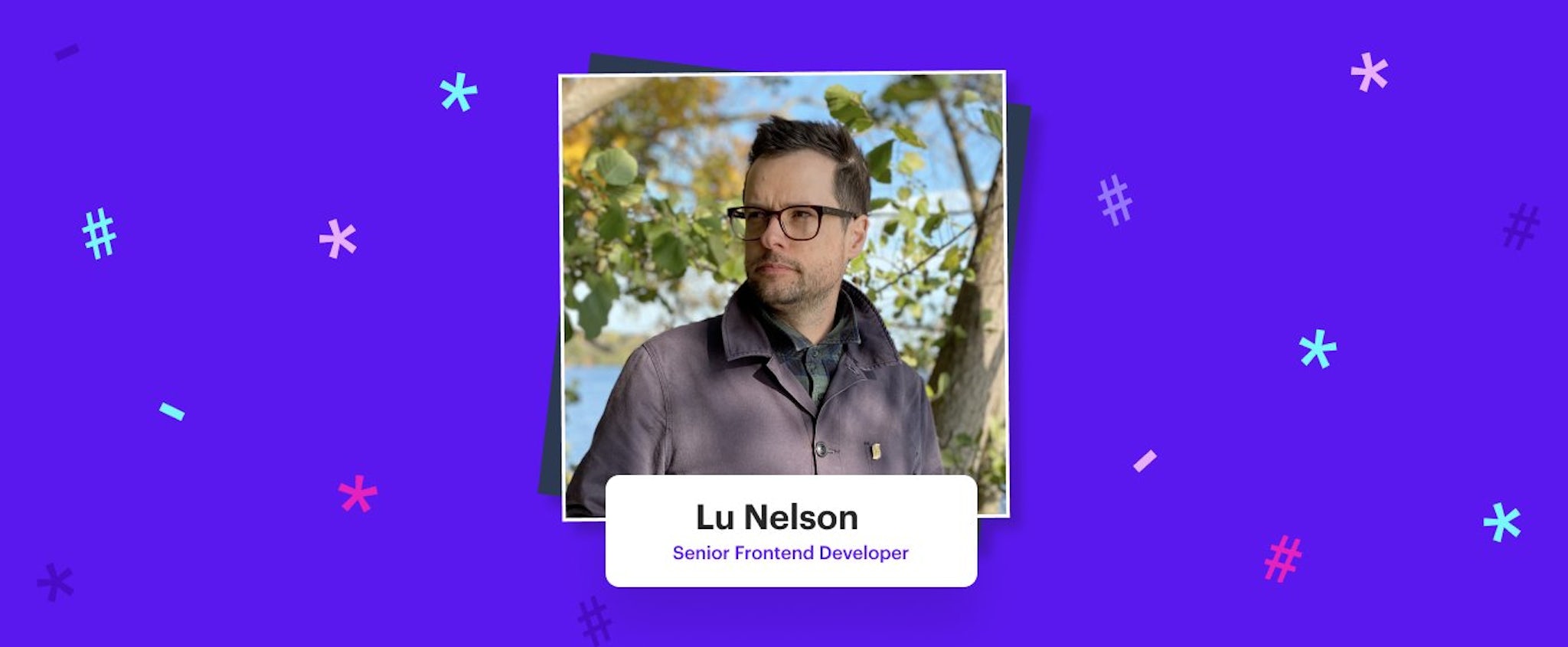June 18th, 2021
The Humans Behind the Bots: Lu Nelson
Rasa
At Rasa, our team is building the standard infrastructure for conversational AI. Behind the scenes, the people of Rasa come together from diverse backgrounds to solve today's most interesting challenges in NLP and dialogue management. We're pulling back the curtain to highlight a few of the humans behind the bots.
Today we're talking with Lu, Senior Frontend Engineer at Rasa. We'll learn Lu's story and explore the day-to-day projects and technologies he's passionate about.
Hi, Lu. Tell us about yourself! What was your path to joining Rasa?
I was a freelance front-end developer working with small design agencies for a long time, and I found the posting for the Web Developer role through a friend of mine who'd been working in conversational UI and recommended Rasa as being one of the best startups in the city. So it was kind of serendipitous: I thought the role was a little on the ambitious side and might have hesitated to apply, but it turned out to be a great fit!
Take us through a typical day as a Senior Frontend Engineer. What types of projects do you work on?
The focus of my work is Rasa's websites rather than its products, and in the marketing team we're working on different projects all the time. Generally any given day involves either the front-end side with new pages or components, or the CMS side with modelling or migrating content, or working out the implementation of a longer-term/larger-scope concern such as our design system, style architecture, or user analytics.
Which areas of your work are you most passionate about?
I certainly have my pet areas of interest in my field (design systems, CSS, accessibility, others), and my role affords me lots of opportunity and autonomy to develop those, but what I appreciate about being a developer in the marketing team is the business itself, the fact that we all are engaged with questions of Rasa's growth, and that our work is in some contact with every part of the company.
What's an important problem you're solving at Rasa?
I would characterise the main problem I'm focused on as "enabling my colleagues to publish and reach their intended audience effectively", and that all the other inputs and outputs relate to that. It's a good problem to work on.
How would you describe Rasa in three words?
"vision", "mission", and "solution".
How do you collaborate with other teams at Rasa?
Up to now, our nascent web team has been-as mentioned-a unit inside the marketing team, where my closest collaborator is designer Elise Boyd, and this is remote-first because the majority of our colleagues are in the US; in terms of cross-team collaboration I would say our most frequent partners are the developer relations team (whose concerns largely overlap with ours), and the customer success team, since we relaunched Rasa's documentation sites last year-and I expect those kinds of points of contact to expand in the future, as at some point nearly every team in the company requires some input or output relative to our websites.
What does a culture of diversity mean for you at Rasa?
I think there is a real sense at Rasa that everyone makes an effort to understand and allow for the unique experiences and situations of their colleagues, and I find that this creates a positive atmosphere of attention and respect in which I'm very glad to be included.
How has working at Rasa helped your professional development?
My role covers a lot of ground, and the level of personal performance and responsibility in the marketing team is high, which I would say has pushed a lot of personal growth for me; but in terms of technical skills, probably the whole field of go-to-market technology has added the most in terms of new dimensions to my professional skills.
What's the most interesting thing you've learned lately?
In the fields of front-end engineering and growth-engineering (which feel practically bottomless in terms of things you can learn and innovate) there are almost too many interesting things at any given time, even with the kind of mandate I have in this role, to seek new and better solutions. However one consistently engaging area in the last year for me has been all the innovation and optimisation around JAMStack development, hybrid static + dynamic frameworks, and the techniques one can implement to maximise the performance and ranking of modern websites. This is an area we're actively exploring and leveraging in our projects all the time.
What's the best career advice you've received?
When I first applied to Rasa, the job posting said something to the effect of "if you aren't sure that you fulfil all of these requirements, apply anyway!" which is always good advice; otherwise I think something I learned in being part of a company rather than being a freelancer is that in a good company all of your colleagues are invested in your success, and that they can and will help you.
Thanks Lu! You can find Lu on Twitter.
Want to team up with Rasa? We're hiring! Find open positions for Frontend Web Developer and other roles on our Jobs Board.
